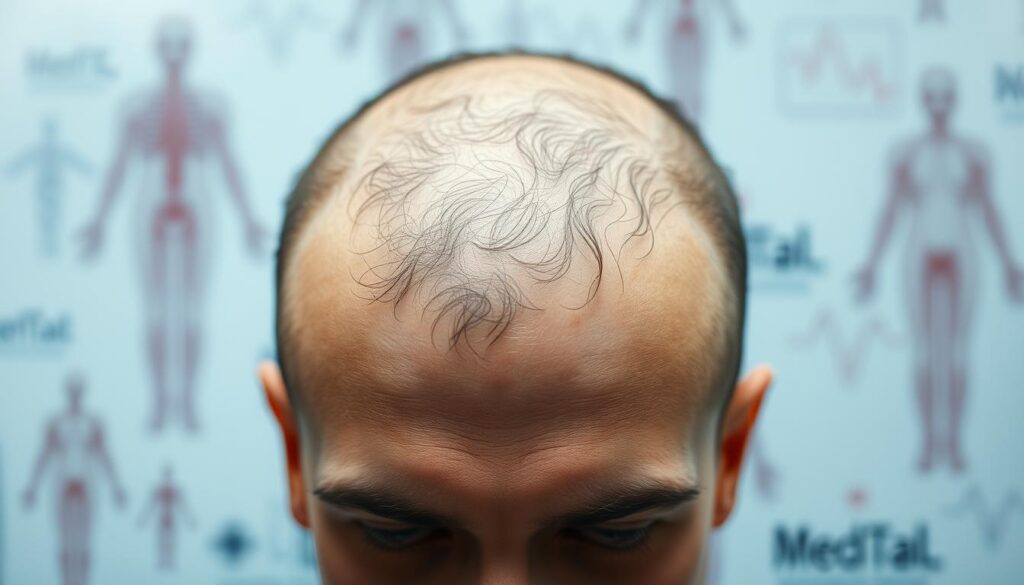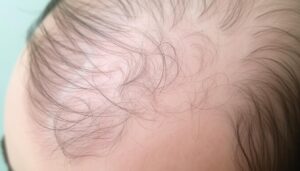Syphilis is a complex sexually transmitted infection (STI) that can affect the body in many ways. Many people wonder if syphilis can cause hair loss. If you’re asking, “Does syphilis cause hair loss?” you’re not alone. We’ll look into the link between syphilis and hair loss, giving you the facts you need to understand this medical connection.

Key Takeaways
- Syphilis is a serious sexually transmitted infection that can lead to various health complications if left untreated.
- The connection between syphilis and hair loss is not fully understood, but there are some potential links.
- Syphilis can cause a form of hair loss known as “syphilitic alopecia” during the secondary stage of the infection.
- If you’re concerned about syphilis and hair loss, it’s important to doo your research.
- Hair loss solution: Scalp Micropigmentation
Understanding Syphilis and Its Effects
Syphilis is a complex sexually transmitted infection (STI) caused by Treponema pallidum. It goes through different stages, each with its own symptoms. Knowing these stages is key to spotting hair loss linked to syphilis. It spreads through direct contact with sores on the genitals, rectum, or mouth. It can also pass from mother to child during pregnancy, causing congenital syphilis.
Stages of Syphilis
Syphilis has four main stages, each with its own symptoms:
- Primary Syphilis: This stage starts with a single, painless sore (chancre) at the infection site, usually the genitals, rectum, or mouth.
- Secondary Syphilis: The infection spreads, causing symptoms like a rash, fever, swollen lymph nodes, and hair loss.
- Latent Syphilis: Here, the infection is dormant, with no visible symptoms. But it’s still present and can reactivate.
- Tertiary Syphilis: This is the most severe stage, causing serious damage to the heart, brain, and other vital organs.
Knowing how syphilis progresses and its stages is vital. It helps spot the link between syphilis and hair loss. Early treatment is key to avoiding long-term damage.
does syphilis cause hair loss
Does syphilis make your hair fall out? Syphilis can cause hair loss, known as syphilitic alopecia. This happens in the later stages of the disease. The immune system’s fight against the bacteria can harm hair follicles.
But, not everyone with syphilis loses their hair. The amount of hair loss varies from person to person. Understanding how syphilis and hair loss are connected is key.
Syphilis and Hair Loss: What’s the Link?
Can syphilis cause hair loss? In the tertiary stage, the immune system attacks hair follicles. This causes patchy or diffuse hair loss, known as syphilitic alopecia.
Hair loss from syphilis is usually not permanent. It can go away with proper treatment. But, in some cases, the damage can be more lasting.
| Symptom | Description |
|---|---|
| Syphilitic Alopecia | Patchy or diffuse hair loss due to the immune system’s response to the syphilis bacteria, which can damage the hair follicles. |
| Reversibility | Hair loss associated with syphilis is typically not permanent and may resolve once the infection is properly treated, though in some cases, the damage can be more severe and lead to persistent or even permanent hair loss. |
Syphilis hair loss is not a universal symptom. Not all individuals with syphilis will experience it. The severity and prevalence of hair loss vary.
If you think you’re losing hair due to syphilis, get medical help. Early treatment can prevent or lessen complications, including hair loss.
Conclusion
Syphilis and hair loss, known as syphilitic alopecia, are linked but not fully understood. Syphilis can potentially lead to hair loss in some people. If you are experiencing hair loss consider scalp micropigmentation. A non-invasive procedure that can help gain your confidence back
Come visit us at ScalpMasters, where we help you every step of the way. SMP can make your hair look denser or help with a receding hairline, and much more. There is no better hair loss solution than SMP. Contact us today to schedule your appointment!










